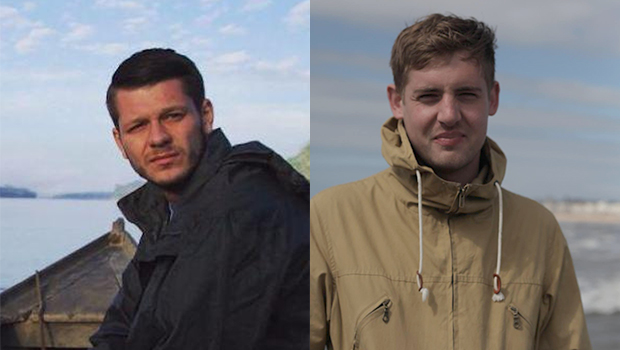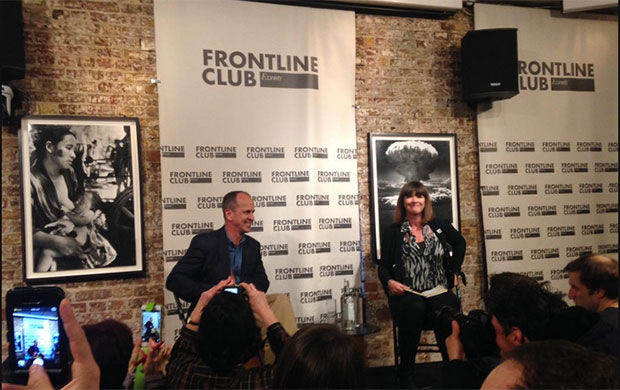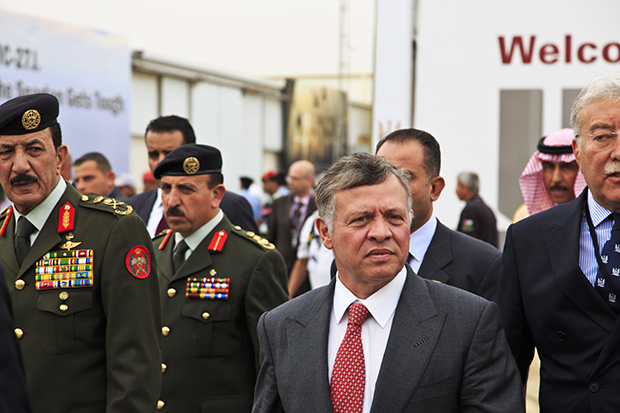1 Sep 2015 | About Index, Campaigns, Press Releases, Turkey, United Kingdom
Wednesday 2 September:
The Foreign and Commonwealth Office issued the following statement:
“We are concerned at the arrest of two British journalists in Diyarbakir on 31 August, who have been charged with assisting a terrorist organisation. The journalists have been given access to a lawyer and were in direct contact with consular officials within 24 hours of their detention.
“Respect for freedom of expression and the right of media to operate without restriction are fundamental in any democratic society. Turkey is a state party to the European Convention on Human Rights and International Covenant on Civil and Political Rights. We would expect the Turkish authorities to uphold the obligations enshrined in those agreements.”
Tuesday 1 September:
Freedom of expression charities have written to UK Foreign Secretary Philip Hammond urging the UK to speak out publicly in defence of freedom of expression following the arrest of two British journalists and an Iraqi translator in Turkey under terror legislation.
The journalists and their fixer were were formally charged by a Turkish court on Monday with ‘aiding a terrorist organisation’. Vice News has described the charges as completely baseless.
The letter from PEN International, English PEN and Index on Censorship highlights the deteriorating situation for media in Turkey and urges Foreign Secretary Philip Hammond to speak out publicly against the arrests.
“Coming shortly after the equally unjust sentencing of Al Jazeera journalists in Egypt, we would note also the worrying increase in the use of terror laws to stifle a free and independent media globally and hope the UK will use its international position to help reverse this disturbing trend,” the groups say in the letter.
The groups have also written to the Council of Europe, of which Turkey and the UK are members, to express their concerns.
A copy of the letter can be found below.
Dear Mr Hammond,
We are writing to you on behalf of Index on Censorship, English PEN and PEN International, charities that campaign for freedom of expression in the UK and globally, to urge the immediate intervention of the British government in the case of three VICE News journalists, including two Britons, who have been charged with terror offences by the Turkish government.
The two British reporters, VICE News journalists Jake Hanrahan and Philip Pendlebury, along with their fixer, Iraqi translator and journalist Mohammed Ismael Rasool, were formally charged by a Turkish court on Monday with ‘aiding a terrorist organisation’. We believe these charges to be baseless.
The three were detained by police with a fourth member of their team as they filmed in the south-east region of Diyarbakir on Thursday. Police interrogated them about alleged links to Islamic State and Kurdish militants.
You will be aware that the Turkish government’s routine use of counter-terrorism charges against journalists is a longstanding cause of concern for international human rights organisations and for the media in Turkey. There are rising fears that Turkey is on the brink of a new media crackdown in the run up to the parliamentary elections: Turkish police conducted a raid on the offices of Koza Koza Ipek Media group today, while an Ankara court has ruled in favour of a general search warrant for the Çankaya district of the Turkish capital (where embassies and foreign missions are based) allowing police to make preventative security searches and detentions for 30 days.
We recognise that Turkey is facing a period of heightened tension in the region. However at such a time it is more important than ever that both domestic and international journalists are allowed to do their vital work without intimidation, reporting on matters of global interest and concern.
A member of the Council of Europe, Turkey is a state party to both the European Convention on Human Rights and the International Covenant on Civil and Political Rights. It is therefore obliged to respect the right to freedom of expression and ensure that journalists are free to gather information without hindrance or threat.
We appreciate the Foreign Office’s consular assistance to the VICE News team and urge you to make a public statement in defence of freedom of expression in Turkey.
Coming shortly after the equally unjust sentencing of Al Jazeera journalists in Egypt, we would note also the worrying increase in the use of terror laws to stifle a free and independent media globally and hope the UK will use its international position to help reverse this disturbing trend.
Yours sincerely,
Jodie Ginsberg
Chief Executive, Index on Censorship
Maureen Freely
President, English PEN
Carles Torner
Executive Director, PEN International
1 Sep 2015 | mobile, News and features, Turkey, United Kingdom
The anti-terror charges against reporters for Vice News in Turkey are not isolated. In recent years, a number of countries have used broad anti-terror laws to restrict the freedom of the press.
Turkey

British journalists Jake Hanrahan, left, and Philip Pendlebury and Iraqi translator and journalist Mohammed Ismael Rasool were filming clashes between pro-Kurdish youths and security forces, according to Vice. (Photos: Vice News)
Two British journalists and a local fixer working for Vice News were charged on Monday 31 August in Turkey with “working on behalf of a terrorist organisation”. They will remain in detention until their trial, the date of which has not yet been announced.
The journalists Jake Hanrahan, Philip Pendlebury and Iraqi translator and journalist Mohammed Ismael Rasool were filming clashes between security forces and youth members of the Kurdistan Workers’ Party (PKK) in the south-eastern city of Diyarbakir on Thursday when they were arrested.
Turkey’s broad definition of terrorism means that any journalist reporting on PKK activities or Kurdish rights can be charged with the offence of making “terrorist propaganda” and jailed.
Index on Censorship Chief Executive Jodie Ginsberg said: “Coming just days after the unjust sentencing of three Al Jazeera journalists in Egypt, these latest detentions of journalists simply for doing their jobs underlines the way in which governments everywhere can use terror legislation to prevent the media from operating.”
Egypt

Peter Greste spoke to a Frontline Club audience about his arrest and detention in Egypt. (Photo: Milana Knezevic / Index on Censorship)
Egypt remains a cause for concern when it comes to press freedom: on 29 August 2015 Al Jazeera journalists Mohamed Fahmy, Peter Greste and Baher Mohamed were sentenced to three years in prison. The journalists were found guilty of of “broadcasting false information” and “aiding a terrorist organisation” – a reference to the Muslim Brotherhood.
The sentencing came just weeks after President Abdel Fattah el-Sisi’s government passed an anti-terror law setting a fine of up to 500,000 Egyptian pounds (£41,600) for journalists who stray from government statements or spread “false” reports on attacks or security operations against armed fighters.
Jordan
Jordan introduced a new “anti-terror” law in 2006 prohibiting, among other things, the engagement in “acts that expose the kingdom to risk of hostile acts, disturb its relations with a foreign state, or expose Jordanians to acts of retaliation against them or their money”. The charge carries a prison sentence of three to 20 years. The law was amended in 2014 to , broaden the definition of terrorism.
Interpretation of the law has been varied. According to the Committee to Protect Journalists (CPJ), in April 2015 a journalist was jailed for criticising the Saudi-led bombing of Houthi forces in Yemen. Another journalist was detained in July 2015 for breaking a recent ban on coverage of a terror plot. Earlier in 2015, an activist who criticised the royal family’s support of Charlie Hebdo on Facebook was sentenced to five months in jail under the anti-terror law.
Tunisia
One month after June’s terrorist attack on Sousse beach killing 38 tourists, for which ISIS claimed responsibility, Tunisia approved new anti-terror legislation.
Under the legislation, website editor Nour Edine Mbarki was charged in connection with publishing a photograph of a car that purportedly transported a gunman behind the beach attack. According to the CPJ, he was charged under Article 18 of the law with “complicity in a terrorist attack and facilitating the escape of terrorists,” which carries a prison term of between five and 12 years. He is currently awaiting a trial date.
Human Rights Watch said the new anti-terror bill “would open the way to prosecuting political dissent as terrorism, give judges overly broad powers, and curtail lawyers’ ability to provide an effective defence”.
Pakistan
Rights groups have long criticised Pakistan’s notorious anti-blasphemy laws for their effect on freedom of expression in the country. But strengthened anti terror legislation is also impacting the way journalists operate in the country.
In June, three Pakistani journalists were charged under the Anti-Terrorism Act, reportedly for covering the activities of a dissident politician, according to the Pakistan Press Foundation. A year before, a TV anchor was also charged under the law.
One to watch: Kenya
Following two separate attacks by al-Shabab militants in December, Kenya’s President Uhuru Kenyatta signed into law a new security bill that could curtail press freedom. Under the new law, journalists could face up to three years in jail if their reports “undermine investigations or security operations relating to terrorism” – or even if they published images of “terror victims” without police permission.
This hasn’t come into play yet – in February, the Kenyan High Court threw out several clauses, including those that could impact media freedom. The government has said it would consider lodging an appeal.
This post was written by Emily Wight for Index on Censorship
This article was posted on 1 September 2015 at indexoncensorship.org
1 Sep 2015 | Azerbaijan, Azerbaijan Statements, Campaigns, mobile, Statements
The Sport for Rights coalition strongly condemns the sentencing of Azerbaijani journalist Khadija Ismayilova to a staggering 7.5 years in jail. On 1 September, the Baku Court of Grave Crimes convicted Ismayilova on charges of embezzlement, illegal entrepreneurship, tax evasion, and abuse of office. Ismayilova was acquitted of the charge of inciting someone to attempt suicide. Sport for Rights considers the charges against Ismayilova to be politically motivated and connected to her work as an investigative journalist, particularly her exposure of corruption among the ruling Azerbaijani elite.
“We condemn today’s verdict in the case of Khadija Ismayilova, which puts an outrageous yet expected ending to the grotesque proceedings against her”, CPJ Europe and Central Asia Program Coordinator Nina Ognianova said. “The time for business as usual with Azerbaijan is over. We call on Baku’s counterparts in the international community to make no further dealings with this highly repressive state until Ismayilova is unconditionally released and fully acquitted of all fabricated accusations”.
“Khadija Ismayilova’s trial failed to meet minimum fair trial guarantees, a pattern that has been regularly observed by IPHR’s monitors in similar cases in Azerbaijan”, said Brigitte Dufour, IPHR Director. “The defence’s motions are routinely rejected, which runs contrary to the principle of equality of arms – a cornerstone of the right to a fair trial – and indicates that the judges in these trials are openly siding with the prosecution”.
One of Azerbaijan’s most prominent investigative journalists, Ismayilova is also among the most courageous, one of very few willing to report on risky topics such as human rights violations and corruption. In the months leading to her arrest in December 2014, Ismayilova was aware she could be targeted, which she linked to her investigations into the business interests of President Ilham Aliyev’s family. Despite being warned not to return to the country from trips abroad – during which she spoke at international organisations on abuses taking place in Azerbaijan – Ismayilova persisted, speaking out critically until her arrest, and even afterwards, in letters smuggled out from jail.
Sport for Rights believes that in jailing Ismayilova, the Azerbaijani authorities sought to silence her critical voice before the country faced increased international media attention during the inaugural European Games, which took place in Baku in June 2015. Sport for Rights has referred to Ismayilova as a “Prisoner of the European Games” – along with human rights defenders Leyla and Arif Yunus, Rasul Jafarov, and Intigam Aliyev, who were also arrested in the run-up to the games.
“For her thorough and fearless investigative journalism, which has uncovered corruption at the highest levels of power, Khadija has earned numerous accolades, including PEN American’s 2015 Barbara Goldsmith/Freedom to Write Award”, said Karin Deutsch Karlekar, director of Free Expression programmes at PEN American Center. “However, speaking the truth has grave consequences in Azerbaijan, where independent reporting has been all but extinguished through farcical trials, imprisonment, murder, and other forms of severe harassment. We demand that the government cease this unprecedented witch-hunt against journalists and their family members, and enable Azerbaijani citizens to freely access a range of news and information”.
The harsh sentencing of Ismayilova is the latest incident in an unprecedented crackdown being carried out by the Azerbaijani authorities to silence all forms of criticism and dissent. Less than two weeks before Ismayilova’s verdict, the same court sentenced human rights defenders Leyla and Arif Yunus to 8.5 and seven years in jail, respectively. Authorities have so far disregarded the widespread calls for humanitarian release of the couple, who both suffer serious health problems that continue to worsen in custody. Human rights defenders Intigam Aliyev, Rasul Jafarov, and Anar Mammadli are also serving staggering sentences of 7.5 years, six years and three months (recently reduced from 6.5 years by the appellate court), and 5.5 years, respectively, all on politically motivated charges.
The situation for journalists is also dire. On 9 August, journalist and chairman of the Institute for Reporters’ Freedom and Safety Rasim Aliyev died in hospital after being severely beaten the previous day. Aliyev had reported receiving threats in the weeks leading to the attack, and the police failed to provide him with protection. This attack followed an earlier high-level threat against an Azerbaijani journalist, Berlin-based Meydan TV Director Emin Milli, in connection with his critical reporting on the European Games. In addition to Ismayilova, journalists Nijat Aliyev, Araz Guliyev, Parviz Hashimli, Seymur Hezi, Hilal Mammadov, Rauf Mirkadirov, and Tofig Yagublu are also behind bars on politically motivated charges.
The Sport for Rights coalition reiterates its call for Ismayilova’s immediate and unconditional release, as well as the release of the other jailed journalists and human rights defenders in Azerbaijan. The coalition also calls for the Azerbaijani government to take immediate and concrete steps to improve the broader human rights situation in the country, particularly in the context of the upcoming November parliamentary elections. Without independent media coverage, including critical voices such as Ismayilova’s, the elections cannot be considered free and fair. Finally, Sport for Rights calls for greater vigilance by the international community to developments in the country, and increased efforts to hold the Azerbaijani government accountable to its international human rights obligations.
Supporting organisations:
ARTICLE 19
Civil Rights Defenders
Committee to Protect Journalists
Freedom Now
Front Line Defenders
Helsinki Foundation for Human Rights
Human Rights House Foundation (HRHF)
Index on Censorship
International Federation for Human Rights (FIDH), within the framework of the Observatory for
the Protection of Human Rights Defenders
International Media Support (IMS)
International Partnership for Human Rights (IPHR)
NESEHNUTI
Norwegian Helsinki Committee
PEN American Center
People in Need
Platform
Polish Green Network
Solidarity with Belarus Information Office
World Organisation Against Torture (OMCT), within the framework of the Observatory for the Protection of Human Rights Defenders
1 Sep 2015 | Azerbaijan, Azerbaijan News, Campaigns, Statements

Khadija Ismayilova
Investigative journalist Khadija Ismayilova was sentenced to 7 years and 6 months years in prison in an Azerbaijani courtroom.
“We strongly condemn today’s verdict and the politically motivated trial behind it. Yet again, Azerbaijan shows its disrespect for freedom of expression, due process and the rule of law”, Index on Censorship Senior Advocacy Officer Melody Patry said.
The multi award-winning journalist was detained on 5 December 2014 and charged with “incitement to suicide” based on accusations — later recanted — by a former colleague. During her detention she was accused of libel, tax evasion and illegal business activity. She was cleared of the incitement charge but convicted of the others.
Index and other international human rights organisations have repeatedly pointed out that the charges were clearly in retaliation for her reporting into corrupt business practices involving members of President Ilham Aliyev’s family. For her refusal to cave to political pressure, Ismayilova has regularly been recognised by the international journalism community, most recently she was awarded the US National Press Club’s highest press freedom accolade.
Ismayilova, who told the court in a pre-trial hearing that the charges were politically motivated, characterised the trial, which began on 7 August, as “an express court. You leave no time for us to discuss the proceedings.”
On 21 August, state prosecutors demanded the court impose a sentence of 9 years for Ismayilova.
In the past year many of Azerbaijan’s fiercest government critics and rights defenders have been imprisoned on spurious charges in retaliation for their work for human rights and democracy.
[smartslider2 slider=”35″]




